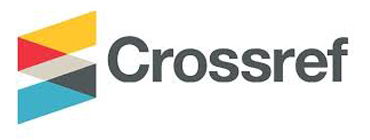THE EFFECT OF MEMRISE APPLICATION ON STUDENTS’ VOCABULARY MASTERY AT SEVENTH GRADE OF MTs PAB 1 HELVETIA
Abstract
The objective of this study was to determine whether or not the application of memrise had a significant effect on vocabulary mastery of seventh grade junior high school students. The aim of the research is to find out whether the use memrise application has a significant on the students’ ability in vocabulary. This research is a quantitative study with a quasi-experimental design. The implementation is carried out in class VII MTs PAB 1 Helvetia for the 2020/2021 school year. The population was 192 students and the researcher took 32 students for the experimental class and 32 students for the control class, which means 64 students as the sample. In data collection, researchers used a multiple choice test as an instrument. The tests performed were pre-test which was given before treatment and post-test which was given after treatment. Then, the data obtained were analyzed using the t-test with a significance level of 5% (0.05). Furthermore, the researcher found that the mean post-test score in the experimental class was higher than the control class (75.31> 66.40). The t test results also show that t0 (4.03) is higher than t table at a significance level of 5% (0.05) with 62 degrees of freedom of 2.039. Therefore, the results of 4.03> 2.039 result in H0 (null hypothesis) rejected and Ha (alternative hypothesis) accepted. Thus, the application of memrise has a significant effect on the vocabulary mastery of seventh grade in MTs PAB 1 Helvetia.
Full Text:
PDFReferences
Abarghoui, M. A., & Taki, S. 2018. Measuring the effectiveness of using"Memrise" on high school students' perceptions of learning EFL. Theory and Practice in Language Studies, 8(12), 1758- 176.
Abdullah Yusuf Ali.The Meanings of the Illustrious Qur’an with Footnotes. (New Delhi : Adam Publishers & Distributors. 2004) p. 5
Alqahtani, Mofareh. 2015. “The Importance of Vocabulary in Language Learning and How to be taught”, International Journal of Teaching and Education.
Akdogan, E. 2017. Developing vocabulary in game activities and game materials (Master's thesis). Journal of Teaching and Education
Andrew Wright, David Betteridgeamd Michael Buckby. 2010. Games for language learning.Cambridge : Cambridge University Press. P. 171-175.
Arung, F. 2016. Improving The Students' Speaking Skill Through Debate Technique. Journal of English Education, 1(1), 70-76 Berne &Blachowicz, C. L.
Z.,2008.What reading teachers say about vocabulary instruction: Voices from the classroom
Burston, J. 2015. Twenty years of MALL project implementation: A meta-analysis of learning outcomes. ReCALL, 27(01)
Dewi NurAisyah, 2017. The Vocabulary Teaching and Vocabulary Learning : Perception, Strategies, and Influences on the Student’s Vocabulary Mastery. JurnalBahasa Lingua Scientia. Vol.9 No.2 P. 295-296
Deesri, A. 2002. Games in the ESL and EFL Class. Khon Kaen, Thailand: The Internet TESL Journal, Vol. VIII, No. 9. Retrieved January 23, 2020, from (http://iteslj.org/Techniques/Deesri-Games.html)
Dian Fadhilawati.(2016). Learning And Reviewing Vocabulary Through Memrise To Improve Students’ Vocabulary Achievement. Jares, (2016), 1(2): 33-46
Dockstader, J. (2008). Teachers of the 21st century know the what, why, and how of technology integration. Retrieved from http://the-tech.mit.edu/Chemicool/
Donald Ary, Lucy CheserJacobs,Chris Sorensen and AsgharRazavieh. 2010. Introduction to Research in Education8th edition, USA : Wadsworth Cengage Learning
Duman, G., Orhon, G., &Gedik, N. (2015). Research trends in mobile assisted language learning from 2000 to 2012. ReCALL, 27(02), 197-216.
Godwin-Jones, R. (2007). Emerging technologies tools and trends in self-paced language instruction. Language Learning & Technology, 11(2), 10–17
Godwin-Jones, R. (2011). Mobile apps for language learning.Language Learning Technology,15(2), 2-11 retrived from http://llt.msu.edu/issues/june201 1/emerging.pdf.
Gruneberg, M. and Sykes, R. 1991. “Individual differences and attitudes to the keyword method of foreign language learning”. Language Learning Journal.
Hatch, E. & Brown, C. (1995). Vocabulary, Semantics, and Language Education.
Hennessy, S., Ruthven, K., & Brindley, S. (2005). Teacher perspectives on integrating ICT into subject teaching: Commitment, constraints, caution, and change. Journal of Curriculum Studies, 37(2), 155-192.
Hornby. 1995. Advance Learner’s Dictionary. New York: Oxford University Press. http://www.srsdeaf.org/Downloads/Bridge_of_Vocabulary.pdf accessed saturday, january2020 at 12.43 am
John W. Creswell, Educational Research : Planning, Conducting and Evaluating Quantitative and Qualitative Research. (Boston : Pearson Education, 2012), p.297
Karjo, C. H., & Andreani, W. (2018). Learning foreign languages with Duolingo and Memrise. ICDEL,109-112.
Kementerian Pendidikan dan Kebudayaan, BahasaInggris: Buku Siswa, (Jakarta: Balitbang Kemdikbud, 2014), p. III
Kern, R. (2006). Perspectives on technology in learning and teaching languages. TESOL Quarterly, 40(1), 183-210. Retrieved from http://dx.doi.org/10.2307/40264516
Kukulska-Hulme, A., & Shield, L. (2007). An Overview of Mobile Assisted Language Learning: Can mobile devices support conference EuroCALL’07 Conference Virtual Strand.
Milton, James. (2009). Measuring Second Language Vocabulary Acquisition.
Nation, ISP. (2001). Learning Vocabulary in Another Language.
Nunan, D. (1999). Second Language Teaching and Learning. Boston
Nurweni, A. 1997. How many Words do Senior High School Students Acquire per Week.TEFL IN Journal, 8(1): 103-115
Özkiraz, Kadir.(2015). The Role of Games in Teachıng Vocabulary to Fifth Graders.Mersin... The Reading Teacher 62 (4).314-323.26
Peter Waktins. (2007).Learning to Teach English (Published by arrangement with Delta Publishing, first edition).p.34
Reed, J. T., & Hooper, D. (2018). Student perceptions of mobile learning of high frequency vocabulary using the "Memrise" app. The Journal of Kanda University of International Studies, 30, 351-371. Retrieved from http://id.nii.ac.jp/1092/00001486/
Richard, J. C. and Schmidt, R. 2002. Longman Dictionary of Language Teaching and Applied Linguistic (3th Ed.)
Richards, Jack and Renandya, Willy. 2002. Methodology in Language teaching an anthology of current practice.
Stockwell, G. (2008). Investigating learner preparedness for and usage patterns of mobile learning. ReCALL, 20(3), 253- 270
Sugiyono. (2015). Metode penelitian pendidikan. Bandung: Alfabeta,Cv Sudijono A. 2003. Pengantar Statistik Pendidikan. Jakarta: Raja Grafindo.
Sweeney, P. & Moore. C. (2012). Mobile Apps for Learning Vocabulary: Categories, Evaluation and Design Criteria for Teachers and Developers. International Journal of Computer-Assisted Language Learning and Teaching, 2(4), 1-16, OctoberDecember 2012.Mastery Through Games (A Classroom Action Research in The Islamic Kindergarten of Al- Irsyad Madiun)
Thornburry, Scott, (2002), How to Teach Vocabulary Vacca, Richard & Vacca, Anne. (1991). Content area reading: Literacy and learning across the curriculum.
Walker, L. (2016). The Impact of Using Memrise on Student Perceptions of Learning Latin Vocabulary and on Long-Term Memory of Words. Journal of Classics Teaching, 16(32), 14-20.
Wang, P. (2011). The effect of computer-assisted whole language instruction on Taiwanese university students’ English learning. English Language Teaching, 4(4), 10-20.
Webb, S.A. and Chang, A.C.S.(2012). “Second Language Vocabulary Growth”. ELCJournal Www.memrise.com.Accessed:januar y,23.2020.app memrise from https://www.memrise.com/
Refbacks
- There are currently no refbacks.

This work is licensed under a Creative Commons Attribution-NonCommercial-ShareAlike 4.0 International License.
INDEXING
Bright Vision by UIN Sumatera Utara Medan is licensed under a Creative Commons Attribution-NonCommercial-ShareAlike 4.0 International License.
Based on a work at http://jurnaltarbiyah.uinsu.ac.id/index.php/brightvision.









